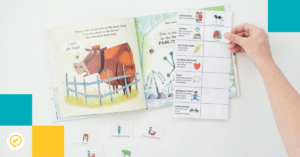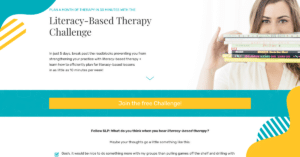As SLPs, we have quite a bit on our plates, don’t we?
I love using apps in therapy to make prep a little easier (and less messy)!
Today, we’re going to dive into some of my favorite apps for vocabulary intervention. The research articles I reach never mentioned these apps in particular. That said, I did apply what I learned from the research to make the most of these wonderful tools.
Spoiler Alert: These aren’t your typical vocabulary apps.
I think target selection should be individualized for the student (and not dictated by an app or a deck of cards). This is something that was a little bit out of my comfort zone initially, but it was so worth the effort.
So let’s dive in…!
Many of these apps are free and can be used to target vocabulary goals at almost any age.
1. Learner’s Dictionary
We know about the importance of student-friendly definitions, and this is a great starting point!
2. Epic
Epic offers a huge selection of books. You can easily access books that align with the curriculum. A must-have for literacy-based therapy!
The next few apps are all about student engagement! “Vocabulary learning is effective when it entails active engagement that goes beyond definitional knowledge” (NRTAC, 2010). That’s exactly what these apps are meant to do! It also gives us tools to implement some evidence-based strategies.
3. ChatterPix
This is a fun way to practice saying new target words and creating sentences. The student might say the word/sentence once, but they’ll automatically get visual feedback (from seeing themselves say the word) and auditory feedback (from hearing the word be repeated). We’re all about increasing those meaningful exposures, right?! Plus the novelty is a surefire way to boost engagement and learning!
4. Little Spinner
Option 1: You could take pictures of scenes in a book. The student spins the spinner and then creates a sentence about the picture using his/her target word.
Option 2: You could add the student’s target words to the spinner. The student spins the spinner and creates sentences using those words. Better yet? They have to build a story using the words that they spin!
5. ToonTastic
Encourage the student to create sentences (or generate a story) using their target words. Once the student is done writing, he/she can create an animation for their sentence/story.
You could share any of these recordings with parents/teachers, as well (with permission)!
I use the following apps for story retell/narrative generation using target words.
Why? “Retelling supports vocabulary learning because, like rereading, it increases children’s exposure to and use of new words and concepts in a story” (Snell, Hindman, & Wasik, 2015). Three studies in this review found that retelling had a significant impact on word learning!
We can also use apps to create digital vocabulary journals.
6. My Story Book Creator
This app makes it easy to create and illustrate a storybook. The app includes audio narration and sharing features.
7. Pictello
Pictello is another storybook app with audio narration and sharing features!
8. Notability
This is my favorite app! I use it for so many goals. I upload my narrative organizer to scaffold student story generation. We can add pictures, audio, drawings, and text. Check out the live video for some specific examples!
Last but not least…
9. Remind
Read more about how I use Remind here!
Why? SLPs aren’t islands, and we can have a greater impact if we collaborate with those around us! Parents can be especially powerful resources.
This is an entirely different topic, but I wanted to plant a seed. There is a tremendous amount of research on parent involvement. There are definitely some obstacles related to implementing this (especially for school-based SLPs), but Remind is a fabulous tool that can be used to bridge some of those gaps.
Here are some of the articles I reviewed when making my picks!
Broen, P. A., & Westman, M. J. (1990). Project parent: A preschool speech program implemented through parents. Journal of Speech and Hearing Disorders, 55, 495–502.
Cincinnati Children’s. (2011). Partnering with parents for greater treatment outcomes in speech-language pathology. Cincinnati Children’s.
Cirrin, F. M., Schooling, T. L., Nelson, N. W., Diehl, S. F., Flynn, P. F., Staskowski, M., … Adamczyk, D. F. (2010). Evidence-based systematic review: Effects of different service delivery models on communication outcomes for elementary school-age children. Language, Speech, and Hearing Services in Schools, 41, 233–264.
Gillam, S. L., Olszewski, A., Fargo, J., & Gillam, R. B. (2014). Classroom-based narrative and vocabulary instruction: Results of an early-stage, nonrandomized comparison study. Language, Speech, and Hearing Services in Schools, 45, 204–219.
Cirrin, F. M., Schooling, T. L., Nelson, N. W., Diehl, S. F., Flynn, P. F., Staskowski, M., … Adamczyk, D. F. (2010). Evidence-based systematic review: Effects of different service delivery models on communication outcomes for elementary school-age children. Language, Speech & Hearing Services in Schools, 41, 233–264.
Girolametto, L., Weitzman, E., & Greenberg, J. (2012). Facilitating emergent literacy: Efficacy of a model that partners speech-language pathologists and educators. American Journal of Speech-Language Pathology, 21, 47–63.
Justice, L. M., & Pence, K. (2007). Parent-implemented interactive language intervention: Can it be used effectively? EBP Briefs, 2(1), 1–13.
Kaiser, A. P., & Roberts, M. Y. (2013). Parents as communication partners: An evidence-based strategy for improving parent support for language and communication in everyday settings. Perspectives on Language Learning and Education, 20, 96–111.
Mount, M. (2014). Facilitating cohesive service delivery through collaboration. Perspectives on School-Based Issues, 15(1), 15–25.
Roberts, M. Y., Kaiser, A. P., Wolfe, C. E., Bryant, J. D., & Spidalieri, A. M. (2014). Effects of the teach-model-coach-review instructional approach on caregiver use of language support strategies and children’s expressive language skills. Journal of Speech, Language, and Hearing Research, 57, 1851–1869.
Roberts, M. Y., & Kaiser, A. P. (2011). The effectiveness of parent-implemented language interventions: A meta-analysis. American Journal of Speech-Language Pathology, 20(3), 180–199.
van Kleeck, A. (2013). Guiding parents from diverse cultural backgrounds to promote language skills in preschoolers with language disorders: Two challenges and proposed solutions for them. Perspectives on Language Learning and Education, 20, 78–85.
That’s all for now!
What are your favorite apps?
Leave us a comment below!
Want to hear more about vocabulary intervention?
Enter your name and email below to follow this series! We’ll send you a weekly email (and a bonus resource) to help you implement these vocabulary strategies with your caseload!




Reader Interactions